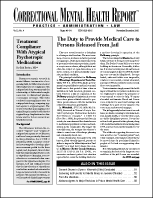The Correctional Psychiatrist’s Obligation to Report Patient Abuse: A Dialogue
Author: Fred Cohen.; James L. Knoll IV, M. D..; Terry Kupers, M. D., M. S. P..; Charles Scott, M. D..; Kathy Burns, M. D., M. P. H..
Source: Volume 15, Number 05, January/February 2014 , pp.67-74(8)

< previous article |next article > |return to table of contents
Abstract:
A colloquy on the duty of correctional mental health clinicians in instances where there is evidence of staff neglect or mistreatment. The discussion begins with two vignettes, inspired by actual events, in which inmates with mental disorders are subject to varying degrees of abuse or neglect—one placed in administrative segregation for 90 days, the other subject to teasing and harassment by staff. After opening the discussion with a review of case law (including Tarasoff) and a recently issued NCCHC position on the “dual agency” problem, Cohen invites comment from four distinguished practitioners. Cohen begins the conversation, “Practicing psychiatry (or simply providing mental health care) in a correctional setting is a daunting undertaking. The military, hierarchical model of corrections where security is paramount, and those not in uniform viewed as somewhat suspect, creates one set of hurdles. The inmate-as-patient creates additional problems. Inmates cannot choose their care provider or treatment and an inmate complaint about care too often will be seen as evidence of ingratitude.” Institutional cynicism over inmate complaints can lead to clinician inaction or delay that, in turn, too often may lead to serious harm, even death. In a series of dialogues with Drs. Knoll, Kupers, Scott, and Burns, this issue of Correctional Mental Health fully explores the inherent conflicts that arise from the dual-agency role of the clinician, and seeks to provide useful guidance for practitioners as they navigate these difficult waters.Keywords: mental health care; correctional culture; Tarasoff; dual agency
Affiliations:
1: Executive Editor Correctional Mental Health Report; 2: SUNY Upstate Medical University; 3: The Wright Institute; 4: University of California, Davis; 5: Ohio Department of Rehabilitation and Correction.